WASHINGTON — The World Health Organization (WHO) announced a new variant of concern called B.1.1.529, or "Omicron," on Nov. 26. The agency said that South Africa first reported the variant to the WHO on Nov. 24, with the first confirmed specimen collected on Nov. 9.
The WHO decided to name COVID variants based on, and in order of, the Greek alphabet. The alphabet is used as a substitute for scientific names.
"While they have their advantages, these scientific names can be difficult to say and recall, and are prone to misreporting," the WHO wrote in May. "As a result, people often resort to calling variants by the places where they are detected, which is stigmatizing and discriminatory. To avoid this and to simplify public communications, WHO encourages national authorities, media outlets and others to adopt these new labels."
But some people online claim the World Health Organization skipped two letters of the Greek alphabet, Nu and Xi, and went straight from the 12th letter, Mu, to the 15th letter, Omicron.
THE QUESTION:
Did the World Health Organization skip two letters of the Greek alphabet when naming the Omicron variant?
THE SOURCES:
- World Health Organization (WHO) statement
- "World Health Organization Best Practices for the Naming of New Human Infectious Diseases"- May 2015
THE ANSWER:
Yes, the World Health Organization skipped Nu and Xi when naming the Omicron variant.
WHAT WE FOUND:
Our Verify researchers turned to the WHO and a 2015 paper on the agency's best practices for naming infectious diseases.
The WHO said they did skip the two letters, because they felt Nu would be too confusing with the word “New." They skipped Xi because they didn't want to offend anyone.
“It is a common surname and WHO best practices for naming new diseases… suggest avoiding ‘causing offense to any cultural, social, national, regional, professional or ethnic groups,'” WHO said in a statement.
In the WHO's best practices document, it says that disease names "may not include: geographic locations like cities, countries, regions, or continents; people's names; species or a class of animal or food; cultural, population, industry or occupational references; or terms that incite undue fear (e.g. 'unknown' or 'death')."
So we can verify, the WHO did skip two Greek letters when naming Omicron.

